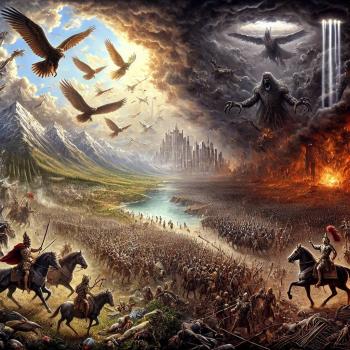All of these wars, mass shootings and suicide bombers we learn about constantly in the news media causes me to think about my belief in world disarmament. I believe that before Jesus comes back, the world is going to disarm itself of not only all weapons of mass destruction, such as nuclear weapons, but all modern weapons as well, such as missiles, bombs, tanks, guns, etc. It will take quite some time to do and will require very sophisticated systems of survelliance. A nuclear war, perish the thought, would surely accelerate the process. My eschatology allows for such world disarmament, but it didn’t used to.
I am a former Dispensationalist. Dispensationalism is a theological system first promulgated by the Plymouth Brethren. More precisely, John Nelson Darby, the charismatic leader and cause of the first split among these Brethren, resulting in Exclusive Brethren, is regarded as “the father of Dispensationalism.”
So, what is Dispensationalism? It is an overall view of human history in which God treats humans differently according to certain dispensations in history. Actually, all Christians arguably are to some extent dispensational because the Christian Bible has two parts: Old Testament and New Testament. In this case, “testament” is synonymous with “covenant.” Thus, God makes two covenants with his people Israel: the old, Mosaic covenant (e.g., Deuteronomy 4.13) and the new covenant (e.g., Jeremiah 31.31) into which the predominantly Gentile church is engrafted (Romans 11.11-24). But Darby had several dispensations, and one involved what he called “the secret rapture” of the church.
The Plymouth Brethren began at the end of the first quarter in the nineteenth century in especially Plymouth, England, and Dublin, Ireland, where Darby was from. These people had a profound interest in biblical prophecies, especially those involving the endtimes (eschatology). Darby taught, and all subsequent Plymouth Brethren (some call them Christian Brethren) believed, that Jesus would literally return from heaven in the future to establish his millennial kingdom on earth (Revelation 20). This viewpoint is called “premillennialism,” meaning Jesus will return to earth before he establishes his millennial kingdom prophesied in Revelation 20, and I still advocate it. This was the viewpoint embraced by several early church fathers, including Irenaeus and Hippolytus. The two other prominent millennial viewpoints that later came into existence are “postmillennialism” and “amillennialism.”
But Darby was unique among premillennialists by also teaching concerning Jesus’ yet future, second coming that it would occur in “two stages” separated by seven years. That is, Jesus would come from heaven into the earth’s atmosphere, translate living saints and raise them up to himself, later called “the rapture,” then resurrect dead church saints (1 Thessalonians 4.14-18) and take all of them to heaven. Then would transpire seven years of tribulation on earth. After that, Jesus would leave heaven again, bringing with him all of his church saints, and come down to earth to establish his millennial kingdom. Dispensationalists used to call this final coming of Jesus “the Second Advent.” So, the first stage of Jesus’ return is “the rapture,” and the second stage of Jesus’ return is “the Second Advent.” This overall teaching of Darby is called “pretribulationalism,” meaning the rapture will occur before the tribulation. Many other churches, especially in the U.S., eventually embraced this teaching on eschatology until today without adopting the larger Dispensational system of theology. Thus, most American Christians may be pretribulational. But ironically, hardly any distinguished biblical scholars advocate this pretribulational scheme today, and some of them ridicule it.
So, pretribulationalism teaches three comings of Jesus to earth, although Dispensationalists don’t like to admit this. Along with this rapture teaching, Darby also taught his “doctrine of imminence.” That is, Jesus’ coming to rapture his church is “imminent,” meaning it could happen at “any moment.” This requires that there are no biblical prophecies that must be fulfilled prior to the rapture of the church. Past history nullifies this presupposition. For example, prior to the reestablishment of Israel as a nation in 1948, Dispensationalists were adovcates of Zionism, claiming it is prophesied in the Bible, to which I agree. But because of their doctrine of imminence, Dispensationalists would have said that this prophecy would not be fulfilled prior to the rapture, but after it, and thus they were proved wrong about that.
I was taught Dispensationalism, and thus pretribulationism, at my new church when I went to college in Houston in 1959. I believed all of it until late 1971. That’s when my personal Bible study caused me to question this teaching. I then went to Dallas Theological Seminary–the foremost Dispensational stronghold in the world–and for five consecutive days, fifteen hours each, I studied in their library books written by Darby and other Plymouth Brethren Bible teachers about this subject. I concluded that, according to the Bible, Darby’s pretribulationalism was dead wrong!
I then changed to believing what is called postribulationism. This means the Bible teaches that Jesus will return only a single, second time at the end of the tribulation and that he will then come to the earth to establish his glorious, worldwide kingdom. Thus, I no longer believed in the doctrine of imminence, which is peculiar only to pretribulationism. Actually, this posttribulational teaching, that I have held for nearly 45 years, is also called “historic premillenialism” because those early church fathers believed in it.
Darby and other Brethren teachers generally touted a hermenetic rule for interpreting biblical prophecies, and it was that they should be interpreted literally unless the context clearly indicates otherwise. But Darby and all pretribulationists seem to have been blind to fact that their doctrine of imminence sometimes prevented them from exercising this “golden rule,” as they sometimes called it, of interpreting unfulfilled biblical prophecies. That is, they had to interpret them according to the time in which they lived because of their view that the rapture could occur at any moment, and it was impossible for some of these yet unfulfilled biblical prophecies to be fulfilled within the seven years of tribulation.
An example of this duplicity in Dispensational teaching is the issue of what type of weapons will be used in fighting wars during and at the end of the tribulation. There are multiple biblical texts in which this issue arises, and foremost among them is Ezekiel 38-39. In fact, it is one of the Dispensationalists favorite eschatological texts in the Bible. It describes at length a great war in which “Gog of the land of Magog” will marshall armies of various nations (I believe all of the nations) in attacking Israel in its land. Dispensationalists usually interpreted this “Gog” as Russia or the previous Soviet Union. I think that is quite wrong and that Gog will be a man–the final Antichrist. (See my book Warrior from Heaven.)
Ezekiel the Prophet represents God in describing this multitude of forces led by Gog as an “army, horses and horsemen, all of them clothed in full armor, a great company, all of them with shield and buckler, wielding swords. . . . all of them with buckler and helmet” (Ezekiel 38.4-5). But God says to Gog, “I will strike your bow from your left hand, and make your arrows drop out of your right hand. You shall fall upon the mountains of Israel, you and all your troops and the peoples that are with you. I will give you to birds of prey of every kind” (Ezekiel 39.3-4). God then adds, “Then those who live in the towns of Israel will go out and make fires of the weapons and burn them–bucklers and shields, bows and arrows, handpikes and spears–and they will make fires of them for seven years. They will not need to take wood out of the field or cut down any trees in the forests, for they will make their fires of the weapons” (vv. 9-10).
All pretribulationalists have claimed that this great war will occur either sometime during the yet future tribulation or at the end of it, as I believe. Obviously, if this scenario of primitive weapons in Ezekiel 38-39 is supposed to be interpreted literally, as pretribulationalists would otherwise do, the entire world must first disarm itself of all weapons of mass destruction as well as all other modern weapons.
But since pretribulationists believe the rapture of the church is imminent, most of them cannot accept a literal interpretation of these weapons in Ezekiel 38-39. It is because such a world disarmament obviously would require many decades to occur, thus a longer time period than a few years or a maximum of seven years after the rapture. Moreover, this pretribulationist failure to interpret these weapons in Ezekiel 38-39 literally prevents perhaps most pretribulationalists from foreseeing and advocating world disarmament of our modern weapons of mass destruction and then the less advanced weapons, such as non-nuclear missiles, bombs, guns, etc., all of which must happen if Ezekiel is right about Gog and his multitude using bows and arrows, swords, and spears to fight this great war.
That is why Hal Lindsey,in his mega bestseller The Late Great Planet Earth, and Tim LaHaye and Jerry Jenkins, in their fiction series Left Behind, interpret such weapons in the Bible as tanks, bombs, guns, etc. They had to so interpret them because of their doctrine of imminence regarding the any moment rapture. In his Late Great Planet Earth, Lindsey inteprets these weapons in Ezekiel 38-39 as “language of accommodation.” (Lindsey and I come from the same church in Houston where we were first taught this.) On the contrary, there is nothing in the context of Ezekiel 38-39 to interpret these weapons as anything other than literal, primitive weapons. Thus, Lindsey and many other pretribulationists change Ezekiel’s language to accommodate their doctrine of imminence, and the result is that they are against world disarmament.












